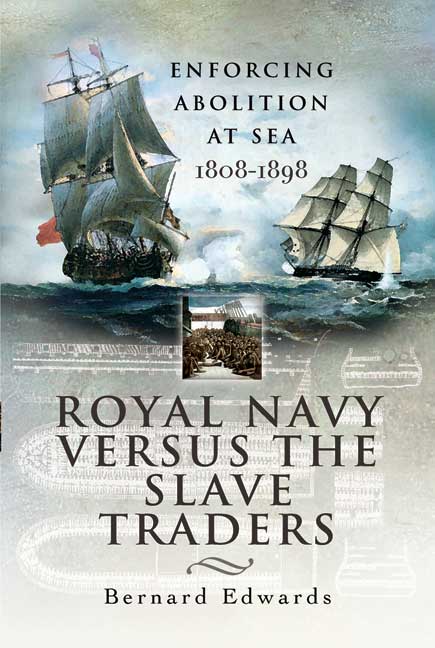Royal Navy Versus the Slave Traders (eBook)
Enforcing Abolition at Sea 1808-1898
Imprint: Pen & Sword Maritime
File Size: 3.1 MB (.epub)
Illustrations: 8pp B&W photos
ISBN: 9781844689491
Published: 18th October 2007
| Other formats available | Price |
|---|---|
| Royal Navy Versus the Slave Traders Paperback Add to Basket | £14.99 |
On 16 March 1807, the British Parliament passed The Abolition of the Slave Trade Act. In the following year the Royal Navy's African Squadron was formed, its mission to stop and search ships at sea suspected of carrying slaves from Africa to the Americas and the Middle East. With typical thoroughness, the Royal Navy went further, and took the fight to the enemy, sailing boldly up uncharted rivers and creeks to attack the barracoons where the slaves were assembled ready for shipment. For much of its long campaign against the evil of slavery Britain's Navy fought alone and unrecognised. Its enemies were many and formidable. Ranged against it were the African chiefs, who sold their own people into slavery, the Arabs, who rode shotgun on the slave caravans to the coast, and the slave ships of the rest of the world, heavily armed, and prepared to do battle to protect their right to traffic in the forbidden black ivory. The war was long and bitter and the cost to the Royal Navy in ships and men heavy, but the result was worthy of the sacrifices made. The abolition of the slave trade led to a scramble for empires and, in place of slaves, Africa began to export cocoa, coffee, timber, palm oil, cotton and ores, all very much in demand in the West.
This book provides a good overview of the British efforts to stop the African slave trade, primarily on the west coast, but also with some detail along the east coast. Edwards tells the story of one of the many conflicts the British navy was involved in during the nineteenth century. As such, it will be of interest to those examining British foreign policy in early Colonial Africa, the Victorian British navy and the slave trade.
The Northern Mariner/Le marin du nord - Vol. 32, No. 3 (Fall 2022)
This book was of particular interest to me because it touches on a topic that I will cover in a future Kydd title. On 16 March 1807, the British Parliament passed The Abolition of the Slave Trade Act. In the following year the Royal Navy’s African Squadron was formed, its mission to stop and search ships at sea suspected of carrying slaves from Africa to the Americas and the Middle East. The Royal Navy went further, and took the fight to the enemy, sailing boldly up uncharted rivers and creeks to attack the barracoons where the slaves were assembled ready for shipment. For much of its long campaign against the evil of slavery Britain’s Navy fought alone and unrecognised. Ranged against it were the African chiefs, who sold their own people into slavery, the Arabs, who rode shotgun on the slave caravans to the coast, and the slave ships of the rest of the world, heavily armed, and prepared to do battle to protect their right to traffic in the forbidden black ivory. The war was long and bitter and the cost to the Royal Navy in ships and men grievously heavy.
Julian Stockwin
Read the full review here
As featured in
Ships Monthly
Featured in
Maritime Engineering Journal - Autumn 2021
I am glad that I was able to read this book. It is extremely informative and not a lot of people (including me) know enough about this subject. I learned a lot while reading this book.
NetGalley, Heather D
It's compelling and high time the men that did the work on the ground to physically stop slavers, were recognised.
NetGalley, Joshua Cartwright
A very interesting look at slave trading in the 1800’s and the efforts to stop the trade by the British Navy. This is not a well known effort and the stories were very well told. It was an extremely informative book.
NetGalley, Ron Baumer
About Bernard Edwards
Bernard Edwards pursued a sea-going career commanding ships trading worldwide. After nearly forty years afloat. Captain Edwards settled in a tiny village in rural South Wales, to pursue his second career as a writer. His extensive knowledge of the sea and ships has enabled him to produce many authentic and eminently readable books which have received international recognition. Beware Raiders!, Attack and Sink!, The Cruel Sea Retold, The Quiet Heroes, Twilight of the U-Boats, Death in the Doldrums, The Road to Russia, The Wolf Packs Gather, The Decoys and U-boats Beyond Biscay have been published by Pen and Sword Books.





















